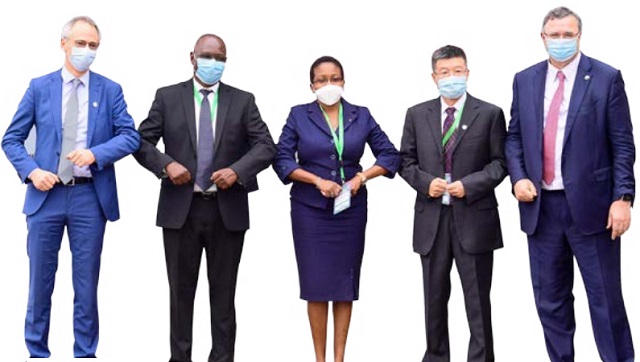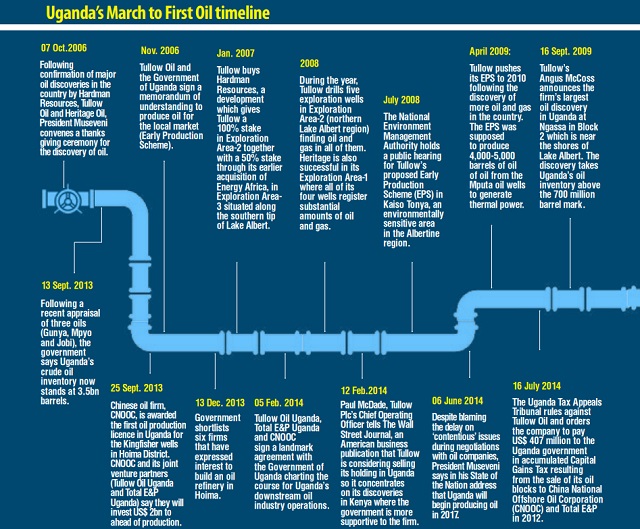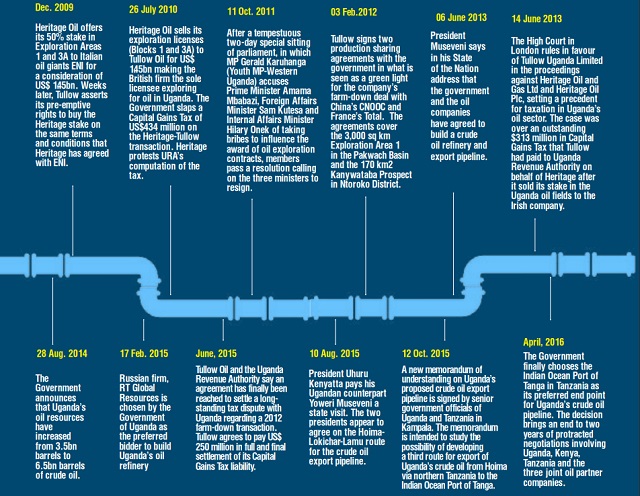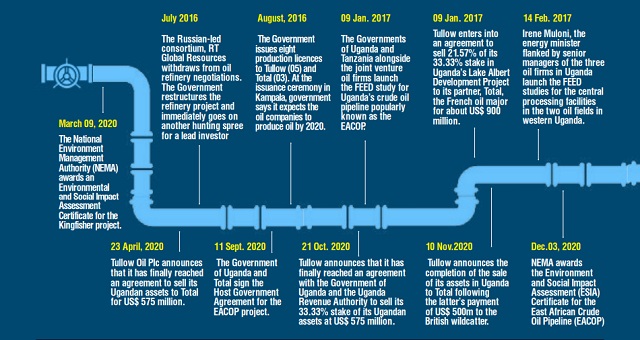
First oil expected in 2025
Kampala, Uganda | RONALD MUSOKE | Finally, the international oil companies, TotalEnergies SE and the China National Offshore Oil Corporation (CNOOC) announced they are ready to produce oil in Uganda in a US$10 billion project.
Reaching this point had taken a whopping 15 years of negotiations and all those involved in the process sounded relieved. The project will now enter the construction phase.
Agreements to mark what is technically called the Final Investment Decision (FID) were signed at an elaborate ceremony on Feb.01 under the watchful eye of President Yoweri Museveni. Tanzania, which is a partner in the East African Crude Export Pipeline (EACOP) that will carry the black gold to the sea, sent its Vice President, Philip Mpango.
Patrick Pouyanné, the chairman and CEO of TotalEnergies, Chen Zhiobiao, the president of CNOOC Uganda Ltd, headlined the event. It is not clear whether it was planned but the pronouncement also coincided with the first day of the Chinese lunar year. The year 2022 is a year of the tiger which represents strength, courage and bravery.
“In the name of the Joint Venture partners and on behalf of TotalEnergies, I announce the Final Investment Decision for the Lake Albert Development Project,” said Pouyanné, at Kololo Independence Grounds in Kampala.
“Today marks the D-Day and we are committed to invest US$ 10bn to develop the Kingfisher and Tilenga projects and the East African Crude Export Pipeline (EACOP),” he said.
Pouyanné’s pronouncement was matter-of-fact. But it caused senior government officials to cheer and applaud. There was even some ululation from Ruth Nankabirwa, the Minister of Energy and Mineral Development who said, “Thanks go to God who has seen Uganda and its partners walk the journey to the FID.”
Nankabirwa said Uganda is now on the path to achieving first oil in 2025. She explained that reaching the FID required the government to revise and amend the Production Sharing Agreements and enabling laws regarding income tax, concluding legislation surrounding the EACOP and facilitating the sale of Tullow Oil’s stake in Uganda’s oil sector.
“The above requirements have been achieved thus facilitating the ceremony we are seeing today,” she said, “Why the celebrations? The oil industry promises to impact the economy positively and Ugandans are going to get jobs.
“It is both a socio-economic and political statement; the country is now more confident than before and we hope we will reach where we want to go.”
“This is an amazing day; a day to celebrate and reflect upon how far we have come and the success the sector has achieved. It gives me great pleasure that the day has come to pass,” said Chen Zhiobiao, the president of CNOOC Uganda Ltd.
Pouyanné said the oil companies were committing US$ 10bn to the Lake Albert Oil Development Project because of the trust the companies have built with the governments of Uganda and Tanzania over the years. Pouyanné spoke against wasting more time.
“It’s a time of execution and time is money,” he said, “So we must not lose a single day.” Should the latest plans move on schedule, Uganda will become Africa’s 11th petroleum producing country in about 36 months’ time.

Oil deals and jobs
The Lake Albert Development Project involves building central processing facilities at two main oil fields. One is named Tilenga and the other is called Kingfisher. The third flagship project is the East African Crude Oil Pipeline (EACOP) in Uganda and Tanzania.
The development of the Tilenga and Kingfisher oil fields will cost the oil firms about US$ 7bn (Tilenga valued at US$4bn and Kingfisher US$3bn) while the East African Crude Oil Pipeline (EACOP) which runs from Hoima in mid-western Uganda to the port of Tanga on the Indian Ocean coast of Tanzania is estimated to cost about US$ 3.55bn.
When construction is completed, the Tilenga and Kingfisher upstream projects are expected to produce about 190,000 and 40,000 barrels per day (bpd) in 2025, respectively while the 1443km East African Crude Oil Pipeline is expected to transport close to 216,000 bpd to the international market.
Government officials in Uganda say close to 160,000 direct and indirect jobs are expected to be created over the next three years during the construction phase.
Energy Minister Nankabirwa said, so far, close to 75% of employees in the oil companies are Ugandans; 27% of whom are in management positions while 64% of those employed in technical fields are Ugandans. Almost 100% of lower rank personnel are Ugandans, she said.
Irene Batebe, the permanent secretary in Uganda’s Ministry of Energy said she now expects work to intensify over the coming months and years in both Uganda and Tanzania. She said the timely approval of permits by other government ministries, departments and agencies will be critical if first oil is going to be realized.
Ernest Rubondo, the executive director of the Petroleum Authority of Uganda (PAU) recently said as much as US$ 15 billion (Approx. Shs56 trillion), will pour into the Ugandan economy over the next three years.
Rubondo said following the launch of the oil projects in April, last year, the licensed oil companies; TotalEnergies and CNOOC have since concluded the procurement processes and are now dishing out contracts for their flagship projects.
The Tilenga project’s main Engineering Procurement Supply Construction and Commissioning (EPSCC) contract were, for instance, awarded to the consortium of McDermott and Sinopec. These two have since commenced work and are currently taking forward detailed engineering and other activities in London, Beijing and Gurugram in India. Ten other contracts for drilling and management of wells for the Tilenga Project have also been issued.
ZPEB Uganda Company Limited which won the contract for the detailed design and construction of the drilling rigs is already working on its assignment. The rigs are to be used in drilling up to 426 wells. Work is scheduled to commence in the last quarter of 2022.
The contract for civil works to prepare over 700 acres of industrial area for the Tilenga project was awarded to Mota Engil Uganda, another local firm. Mota Engil Uganda has sub-contracted various Uganda companies; including Gauff Consultants, Prand Engineering, Civtec, Fabrication Systems among others, to undertake some of these works.
These works include bush clearing, fencing, construction of drainage and internal roads and preparation of the ground to host different facilities. The facilities to be hosted in this industrial area include the Central Processing facility (CPF), construction camps, drilling support bases, and operation support bases, among others. Preparation of the Tilenga industrial site was at 35% completion at the end of 2021 and is expected to be concluded by mid-2022.
Meanwhile, the contract for construction of pads on which the wells for the Tilenga project will be drilled was also awarded to MotaEngil Uganda Ltd. This contract includes preparation of 31 well pad sites, installation of conductor pipes and construction of well cellars among others. Work is expected to commence in the first quarter of 2022, in preparation for the commencement of development drilling in the last quarter of 2022.
The contract to design and construct the Kingfisher Project EPC-2 infrastructure facilities was awarded to China State Construction Engineering Corporation Ltd (CSCEC). The contract for civil works and construction of three well pads for the Kingfisher project together with construction of in-field access roads was awarded to Excel Construction Limited, another Ugandan company. The Petroleum Authority of Uganda says contracts for the Kingfisher project; including drilling and well services are due to be awarded during 2022.
Some of the services provided by Ugandan companies include human resource services, construction, agricultural and crop development, environmental and waste management services, broadcasting services, housing, hotel accommodation and office rental services, security services, ICT accessories and services, education management services, insurance, vehicle hire, tracking and maintenance, medical services and equipment, and legal services.

Tanzania’s EACOP commitment
Tanzania’s vice president Mpango said the oil project will definitely boost trade between the two countries. He said in 2020 alone trade between the two countries had markedly risen to about US$260 million compared to the annual average five years earlier.
Mpango said Tanzania was optimistic the project would raise trade between the two countries over the next three years to US$ 3.5bn, an increase of 60%. Close to 10,000 Tanzanians are also expected to get jobs thanks to the EACOP project.
“There are business opportunities in construction and shipping of oil manufacturing equipment,” he said. Quoting a Chinese proverb, Mpango said, “A good neighbour is a priceless treasure.”
Mpango said the Tanzanian government had already committed TShs 259.96bn to the Tanzania Petroleum Development Corporation as part of its equity to participate in the EACOP while land compensation for the pipeline corridor that the EACOP traverse and civil works 14 priority areas will be completed in May, this year.
Mpango also underscored the importance of citizens buying into the project saying the people in the two countries must take full ownership of the project. He said the people on either side of the border must secure the pipeline; ensure that the environment where the pipeline traverses is not compromised as well report any suspicious activities around the pipeline.
The oil pipeline includes six pumping stations, powered by solar plants in Tanzania and a heat tracing system. The physical characteristics of the oil from Tilenga mean that it needs to be kept at a temperature of 50oC for transportation.
The EACOP and the upstream projects are, however, located in or traverse a particularly sensitive natural environment teeming with rare animal and plant life. But, both senior representatives of the joint oil venture partners once again allayed the fears of the conservationists.
Zhiobiao of CNOOC said the project will be developed in a sustainable manner. “CNOOC is a firm believer in being a responsible energy company. We spare no effort to protect the environment in every region we operate in,” he said.
Meanwhile, Pouyanne said TotalEnergies is fully aware of the important social and environmental challenges it represents.
“We will pay particular attention to use local skills, to develop them through training programs, to boost the local industrial sector in order to maximize the positive local return of this project.”
“With today’s signing of a framework agreement on renewable energy, we are laying the foundation to implement our multi-energy strategy in Uganda and contribute to people’s access to energy,” said Pouyanné.
“Our ambition is to make it an exemplary project in terms of shared prosperity and sustainable development. We are fully aware of the important social and environmental challenges it represents,” Pouyanne said, “We will pay particular attention to use local skills, to develop them through training programmes, to boost the local industrial sector in order to maximize the positive local return of this project.”
This oil development is in line with TotalEnergies’ strategy of only approving new projects if they are low-cost and low emissions.
In particular, the design of the facilities incorporates several measures to limit greenhouse gas emissions well below 20 kg CO2eq/boe, including the extraction of Liquefied Petroleum Gas for use in regional markets as a substitute for burning biomass, and the solarization of the EACOP pipeline.
Pouyanné actually ended the day by signing a memorandum of understanding with the government of Uganda which will see TotalEnergies produce up to 1000MW of renewable electricity by 2030.


****
 The Independent Uganda: You get the Truth we Pay the Price
The Independent Uganda: You get the Truth we Pay the Price



Parliament has opened an inquiry that could unmask the local directors or beneficiaries of Chinese companies undertaking multi-billion shilling projects in key sectors of the Kenyan economy.It promises to lift the veil on the overnight millionaires the projects have created during the tenure of President Uhuru Kenyatta amid speculation that rich and powerful Kenyans have minority ownership in local special-purpose operating firms created by the China-based firms for their projects.